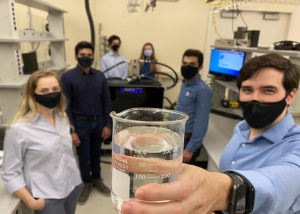
David Warsginer, a Purdue University innovator, and his team are among the quarterfinalists in a national solar innovation contest. Pictured are Warsinger and members of his research group’s Membrane Distillation Subteam.
By Chris Adam, [email protected]
A Purdue University innovator and his team are among the quarterfinalists in a national solar desalination innovation contest. They received the recognition for a technology to use solar power to purify high salinity water, such as treating desalination brine or produced water from oil and gas extraction.
The team includes two company partners, NiekAab Desal, with efforts led by Ali Amiri, and Focused Sun, with their efforts led by Shawn Buckley.
The Purdue team, which created a technology called NoAir, is among 19 quarterfinalists that will advance to the next contest in the U.S. Department of Energy’s $9 million Solar Desalination Prize.
Part of DOE’s American-Made Challenges, the Solar Desalination Prize is designed to accelerate the development of systems that use solar-thermal energy to produce clean water from salt water for municipal, agricultural and industrial use.
“It is an exceptional honor and recognition for our team and technology to have been chosen,” said David Warsinger, an assistant professor of mechanical engineering in Purdue’s College of Engineering. “Our technology aims to use high-temperature solar heat and a hybrid of desalination technologies to purify high salinity water, both in produced water applications in the Permian Basin and other oil and gas operations, as well as coastal applications for municipal water supplies from brackish and seawater.”
Warsinger’s team, via the small company Focused Sun, proposes a linear Fresnel solar-collector system that will generate steam for a process called thermal vapor compression (TVC) paired with membrane distillation.
“This hybrid process allows us to use much higher temperatures than traditional desalination,” Warsinger said. “This gives us much higher efficiency then similar technologies when using solar heat.”
The brine will be preheated by a membrane desalination (MD) system, which is then fed with brine from the TVC system to further desalt and recover water. This MD-TVC system could attain high energy efficiency at low pressure and be used to treat water produced from oil and gas extraction, with negligible electricity input. It can also help improve the water recovered in seawater desalination.
All of the teams have proposed diverse solutions for creating low-cost solar-thermal desalination systems and a pathway to commercialization. Each winner receives $50,000 in cash and advances to the Teaming contest of the competition.
The competitors were chosen from more than 160 submissions and come from 12 states representing universities, industry and national labs.
In Warsinger’s team, Purdue is the academic partner with two company partners: NiekAab Desal and FocusedSun.
Warsinger is an affiliate for Purdue’s Center for the Environment, and this work is in line with the Center’s interests in energy and water challenges, which is one of the Center’s signature research areas.
Warsinger works with the Purdue Research Foundation Office of Technology Commercialization to patent and commercialize technology.





Tell Us What You Think!